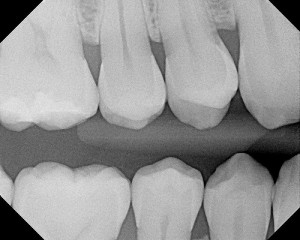Glass can help fillings repair tooth decay
Researchers at Queen Mary University in London have released initial data on fillings that can help repair tooth decay. Robert Hill, a professor at the Institute of Dentistry, says that bioactive glass composites play a key role in what could prove to be a new approach to restorative dentistry.
According to Hill, the bioactive glass composites can release fluoride, calcium and phosphate, all key components in enamel repair. The availability of the necessary materials allows the tooth to “self-repair.” In addition to remineralizing the damaged tooth, the bioactive glass increases the alkalinity of the area around the repair, which discourages the bacteria that causes tooth decay. In tests, the glass fillings helped to remineralize cavity-damaged teeth, and slowed secondary decay. This is significant because the average number of cavities among residents of the UK is seven. Eliminating cavities and preserving the health of teeth is key to improving dental health worldwide.
In addition, the glass prolongs the lifespan of composite fillings, and reduces the need to use mercury amalgam fillings. Although dentists are quick to point out that mercury amalgams do not pose a health danger to dental patients, they are unsightly. Patients overwhelmingly prefer tooth-colored dental composites, but some composites may not last as long as mercury amalgams.Eliminating mercury amalgam fillings by 2020 is an internationally adopted professional goal of dentists.
Bioactive glass was developed to assist in bone repair. The glass is compatible with natural body tissues like bone, and work well in dental repair. Bioglass is used extensively in craniofacial repair, synthetic bone grafts and as a treatment for osteomyelitis. The glass discourages the growth of bacteria and allows bones to heal and regrow. In dental applications, the glass assists with decreasing sensitivity in areas where tooth enamel has been lost.
Glassprimer™ glass paint is a specialized glass coating that bonds permanently to glass surfaces. GlassPrimer also makes a glass surface molecular activator that is designed to work with UV-inkjet glass printing processes. For more information about Glassprimer™ glass paint, please visit the rest of our site. If you’d like to purchase Glassprimer™ glass paint, please visit our online store.
Photo Credit: Matt & Nicole Cummings , via Flickr.com

